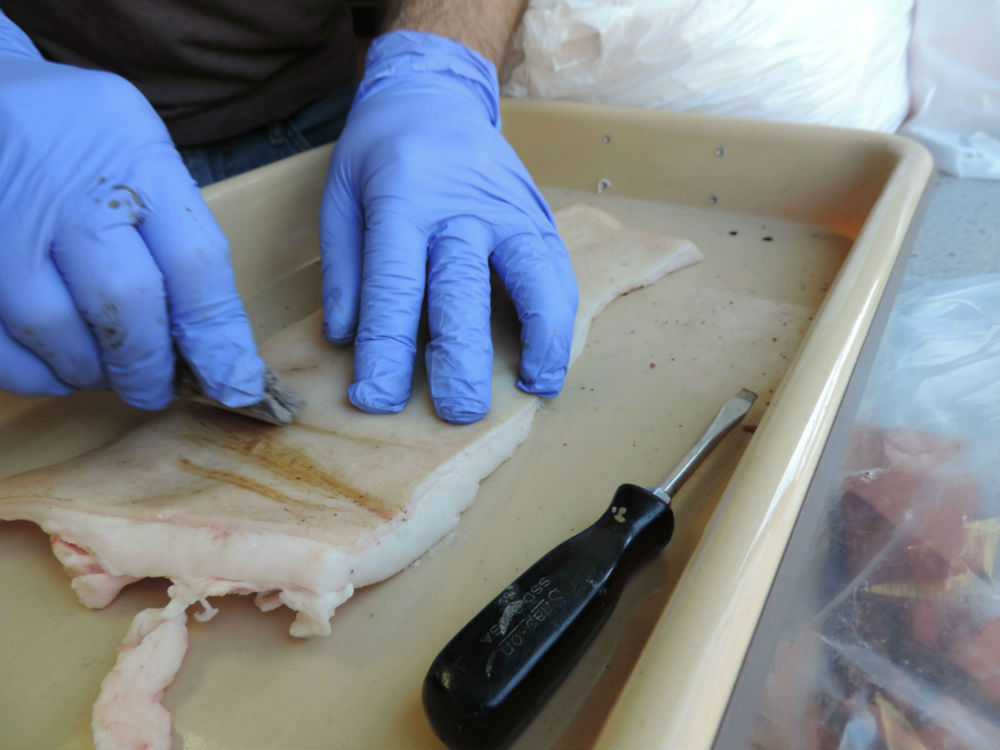US researchers made a blade from their frozen poo – only to discover the noxious knife didn’t work.
The bizarre project, which has caused a social media sensation, was carried out by Anthropologists in Ohio.
They wanted to test claims that an Inuit man froze his own waste to create a knife with which he disemboweled a dog.
The project even saw two of the lead researchers follow a high-protein Inuit style diet for eight days in order to “procure the necessary raw materials for knife production”.
The team wrote up their research in a paper, published in a learned academic journal, with the title: “Knives made from frozen human faeces do not work.”

Stomach-churning images show a piece of pork which is being attacked with the blade, which merely crumbles and leaves brown streaks.
The unusual research title came to light on Twitter, after it was posted yesterday by user John Murray with the caption: “I don’t think I’ve every come across such a random title for an academic paper before.”
The paper’s abstract describes the nature of the work saying: “The ethnographic account of an Inuit man manufacturing a knife from his own frozen faeces to butcher and disarticulate a dog has permeated both the academic literature and popular culture.
“To evaluate the validity of this claim, we tested the basis of that account via experimental archaeology.”
The tale of the Inuit man is described as a “well known account” by the paper.
As the story goes, the man was refusing to move into a settlement with his family and instead wished to remain out on the ice.
In order to prevent him, the family took away his tools, but were not prepared for his creative response.
According to the tale: “In the midst of a winter gale, he stepped out of their igloo, defecated, and honed the feces into a frozen blade, which he sharpened with a spray of saliva.
“With the knife he killed a dog. Using its rib cage as a sled and its hide to harness another dog, he disappeared into the darkness.”
The research was carried out by anthropologists at Kent State University and the Department of Archaeology at the Cleveland Museum of Natural History.
Dr Metin I. Eren, Dr Michelle R. Bebber, James D. Norris, Alyssa Perrone, Ashley Rutkoski, Michael Wilson, and Dr Mary Ann Raghanti found the method to be “largely ineffective”.
According to Dr Eren the study’s true purpose reveals “the importance of testing things” particularly in the era of fake news.
As the paper’s conclusion states: “If one untested claim is used to support a stance – even if that stance is otherwise supported, ethical, or just – then there is no logical reason why a second untested claim cannot then be invoked.
The use of untested claims then becomes the norm, and can be used to support stances that are beneficial to society, as well as those that are harmful.”
Dr Eren explained: “Assumptions are never good enough, even if you think you know the answer to the hypothesis you have to test it out. Once you have stories that aren’t tested, it becomes a slippery slope and then society is in trouble.”
“I’ve seen some people saying did we really need to test this, but we didn’t know for sure before. Well what happens if the result had been different?”
“I’ve seen some jokes about it on Twitter, but I think it’s a lighthearted way to emphasise what we’re saying in that final paragraph, especially given our current political climate.”
He also confirmed that no grad students were made to handle the faeces and that the team received no tax payer finance.
Social media users however remained unconvinced.
Dave Walker replied: “This must be the result of a drunken dinner party where somebody said, ‘Oh yeah? Well let’s see what you can get a research grant for, smart-arse…'”
@79ballboy added: “Surely that’s no s*** Sherlock!”
And Franck Chester said: “I don’t know. If a thug were to threaten me with a sharpened frozen turd, I’d be worried. On so many levels.”